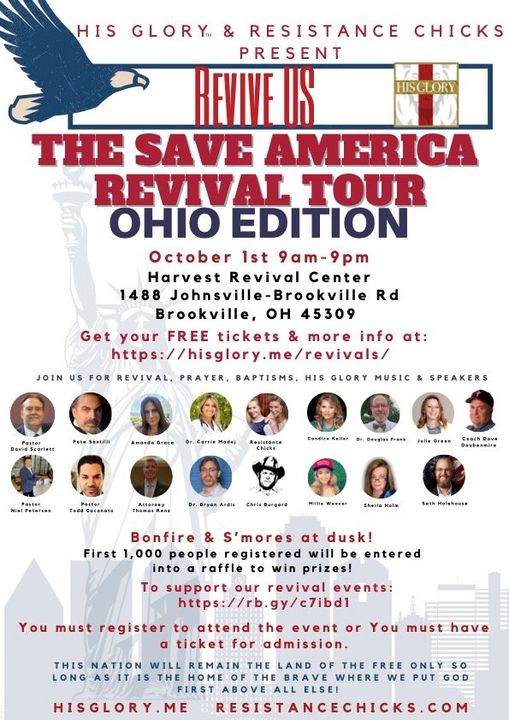Todd Coconato Teaching: God Calls and Anoints Women For Ministry

Resistance Chicks: This is soo GOOD!! Michelle and I had the honor of ministering alongside Pastor Coconato at the Revival in Ohio last September. People were saved, healed, delivered, and filled with the Holy Ghost. Men and women minstered side by side with God getting the glory. The devil wants to sideline your voice however he can. Don’t let him. Both men and women have mighty gifts and callings!
This is Pastor Todd’s teaching on if a woman can do ministry in church or outside of the church.
Todd Coconato https://www.facebook.com/RealToddCoconato/
rtpeoSodsnla5lg0u4attc32h3g02hgiui1824f7g1u1523g2c427hufa12m On the subject of women in ministry.



continuing the discussion of women in ministry as this appears to be a huge topic within the church and I believe if we keep it civil, its a great debate worth having!
As I stated, and will state again, this discussion is not involving a woman as a senior pastor, but rather if women can be in ministry at all, as many seem to believe the answer to that is no.
Also, can a woman be an assistant pastor or hold a ministry title at all? I personally say, “yes”.
Here is more to this discussion and how I have come to this conclusion…
1. “Outstanding among the apostles” (Romans 16:7)
The following women often get overlooked, but even though we do not have long stories about them, their leadership still is recorded in the Bible.
There is Anna, who was a prophet (Luke 2:36) along with the four daughters of Philip who also prophesied (Acts 21:9). A “prophet” in the biblical sense, is a truth-teller delivering God’s message to the world. There is also Phoebe, who was a deacon (Romans 16:1), and Junia, who the Bible describes, not only as an apostle, but an outstanding one (Romans 16:7).
Priscilla, along with her husband, is someone Paul names as a “co-worker” in Christ, and in Acts 18, Priscilla teaches Apollos, a “learned man, with a thorough knowledge of scripture.” Despite his considerable expertise, Priscilla is able to explain “the way of God more adequately” to him, and he expresses no dismay at her gender. In many of the passages where she is mentioned, Priscilla’s name is listed before her husband’s, which is noteworthy in a culture that usually placed husband’s names first, suggesting Priscilla, rather than Aquila, could be the leader of this particular couple. So far, we can suggest that there are women in scripture who held some leadership type roles in the church community.
2. “They told all these things” (Luke 24:9)
In all four gospels, women are the first to learn of Christ’s resurrection when he appears to them, and they are the very first people to share this news with others. Depending on which gospel you read, the first proclaimer is either Mary Magdalene (Mark 16:9-10 and John 20:17-18), Mary Magdalene and the other Mary (Matthew 28:8-10), or Mary, Mary Magdalene, Joanna, and others (Luke 24:9-10). The first time the story of the resurrection is told, it is proclaimed by a woman.
3. “Because of the woman’s testimony” (John 4:39)
We usually know her as the “Woman at the Well,” but I prefer to think of her as the “Woman Who Abandoned Her Water Jar,” because after talking with Jesus, the Living Water, John 4:28 reports that she left her jar behind to go tell the people about Jesus. She left behind what she came to the well to do because she found more important work. Shortly thereafter, the text reports that many Samaritans believed in Christ because of her testimony (4:39), demonstrating she was quite the effective evangelist. The conversation Jesus has with her in John 4 is the longest recorded conversation Jesus has with anyone. Why would Jesus spend all that time talking theology with a woman if he didn’t want her to tell anyone about it? He doesn’t reprimand her for leaving her jar — her “women’s work” — behind. Rather, he encourages her spiritual pursuits and questions, then welcomes those she leads to him.
4. “Until I, Deborah, arose” (Judges 5:7)
So far I have mentioned New Testament women, but there is no absence of strong women in the Hebrew scriptures. Deborah, for example, is named in the Hebrew scriptures as both prophetess and judge. The people come to her for words from God; she leads, directs, and guides them, and no one seems to object based on her gender. In Judges 5, Deborah leads the people in song after leading them to victory in battle. She sings, “They held back until I, Deborah, arose, until I arose, a mother in Israel” (Judges 5:7). Without her leadership, the people would not fight on their own behalf.
Our English translations call her Deborah, “wife of Lappidoth,” but this phrase could also be translated “woman of Lappidoth,” noting where she is from, not who she is married to. Lappidoth means torch, so it is possible that the phrase “woman of Lappidoth” means Deborah is a fiery woman, which seems like an apt descriptor.
5. “Go and inquire of the Lord for me” (2 Kings 22:11-20; 2 Chronicles 34:14-33)
For some reason, Huldah (2 Kings 22:11-20; 2 Chronicles 34:14-33) is always overlooked by the men who say women can’t teach, though in her own day she was anything but invisible. As the story goes, King Josiah’s men were cleaning out the temple when they discovered a scroll of the Book of Law given by Moses. Josiah asked several men, including the high priest, to go inquire of the Lord about the contents of the scroll. Who did all those important men seek out for answers from God? Huldah. (A woman.)
It is worth noting that Huldah was married, but they went to her, not her husband (which, for the record, made perfect sense, seeing as how she was the prophet and he was the keeper of the royal wardrobe). It is also worth noting that Huldah was a contemporary of male prophets like Jeremiah, Zephaniah, and Nahum. The king’s men had lots of great options, and they chose Huldah. She doesn’t just instruct men in this example; men seek out her instruction. The King of Judah, in this case, listened to a woman.
6. “All the women followed her, with timbrels and dancing” (Exodus 15:20) Miriam was the very first person in Hebrew scripture to be named a prophet (Exodus 15:20). I don’t mean that she was the first woman named as a prophet. She was the first prophet.
Furthermore, Moses would never have led the exodus of the Israelites if it weren’t for his sister, Miriam, who kept watch over his basket in the river and ensured her baby brother was cared for. If it weren’t for his mother. If it weren’t the two Hebrew midwives, Shiprah and Puah. If it weren’t for Pharoah’s daughter. Then later, his wife Zipporah saves his life again (Exodus 4:24-26). If it weren’t for the women delivering him over and over, the deliverer of the Hebrew people wouldn’t be around.
7. “And spare my people” (Esther 7:3)
Esther once saved the entire Jewish people from slaughter, which is hardly a minor accomplishment. Easily swayed by the petty and vengeful desires of one of his esteemed nobles named Haman, King Xerxes had signed a law ordering the massacre of the Jewish people. Had it not been for the bold intervention of Queen Esther, many, many people would have perished for no logical reason at all.
Let’s also look at the two powerful men in the book of Esther — Haman and the King — then look at the two quasi-powerful women in the story — Queen Esther and Queen Vashti.
8. “I wish that all the Lord’s people were prophets” (Numbers 11:29)
Technically, Numbers 11 is about two men, but I can’t leave this story out because it is just so relevant. In the story, the Spirit of God falls upon these 70 elders who start prophesying inside the tent of meeting. But Eldad and Medad? They start prophesying in camp, outside the tent — that is, outside the approved parameters. Moses’ assistant, Joshua, gets really worked up about this unauthorized preaching and rushes to find Moses. “My lord, stop them!” he demands. But Moses responds like this: “Would that all the Lord’s people be prophets and God put his Spirit on all of them!” Gosh, what a beautiful line, and presumably when Moses says he wishes all people were prophets, that includes women, since his very own sister Miriam was God’s first prophet. Would that all God’s people be prophets — like Eldad, like Medad, like Miriam!
9. “All of them were filled with the Holy Spirit” (Acts 2:4)
Pentecost Sunday is the day God’s Spirit pours out upon everyone. On Pentecost, Peter quotes the prophet Joel saying, “‘In the last days, God says, I will pour out my Spirit on all people. Your sons and daughters will prophesy, your young men will see visions, your old men will dream dreams. Even on my servants, both men and women, I will pour out my Spirit in those days, and they will prophesy’” (Acts 2:17-18).
Furthermore, the first chapter of Acts is clear that the “they” who gathered included women (Acts 1:14), so there is no reason to think that when the second chapter of Acts reports “they were all together in one place” (again) and “all of them were filled with the Holy Spirit and began to speak in other tongues” (emphasis mine) that the women were suddenly no longer present.
10. “My soul glorifies the Lord” (Luke 1:46)
And finally, while the list could go on, I rest my case with Jesus’s Mother Mary. I cannot imagine any better argument for women in ministry in all of scripture than Mary, who quite literally bore the Word-Made-Flesh in her own body and gave birth to him. She carried God around in her belly and then labored to get that Good News out of her womb and into the world; if that’s not an accurate depiction of some type of preaching, I don’t know what is. She let Love grow within her, fill her out, and expand her. She nurtured Love, fed Love, raised Love, sent Love out into the world, stood vigil when Love died, visited Love’s tomb, and proclaimed Love’s triumph when Love rose from the dead. In addition to the embodied ways in which she ushered the Good News into the world, she also prophesied in Luke 1, offering the now infamous song known as the Magnificat.
I will conclude here by saying that I’ve occasionally heard people attempt to argue that the rarity of female leaders/disciples/preachers/deacons in scripture is proof that God intended those positions to be for men — as if a precious few women got the gig only because the men wouldn’t take the job when they were supposed to. The fact that any women at all were leaders, disciples, preachers, and deacons in the midst of a patriarchal society is proof to me that God’s call on women could not be deterred even by a culture that didn’t readily accept women’s gifts.
Here are more scriptures to enhance what I said above…
Mark 16:15
“And he said to them, “Go into all the world and proclaim the gospel to the whole creation.”
Proverbs 31:26
“She opens her mouth with wisdom, and the teaching of kindness is on her tongue.”
Psalm 68:11
“The Lord gives the word; the women who announce the news are a great host”
Romans 16:3
“Greet Prisca and Aquila, my fellow workers in Christ Jesus,”
Titus 2:3
“Older women likewise are to be reverent in behavior, not slanderers or slaves to much wine. They are to teach what is good”
2 Timothy 4:2
“Preach the word; be ready in season and out of season; reprove, rebuke, and exhort, with complete patience and teaching.”
Matthew 28:19-20
“Go therefore and make disciples of all nations, baptizing them in the name of the Father and of the Son and of the Holy Spirit, teaching them to observe all that I have commanded you. And behold, I am with you always, to the end of the age.”
Acts 1:8
“But you will receive power when the Holy Spirit has come upon you, and you will be my witnesses in Jerusalem and in all Judea and Samaria, and to the end of the earth.”
There are many more scriptures I could reference.
Priscilla and Aquila are presented as faithful ministers for Christ. Priscilla’s name is mentioned first, perhaps indicating that she was more prominent in ministry than her husband.
Did Priscilla and her husband teach the gospel of Jesus Christ to Apollos?
Yes, in their home they “explained to him the way of God more adequately” (Acts 18:26).
In Romans 16:1, Phoebe is called a “deacon” (or “servant”) in the church and is highly commended by Paul.
Women are encouraged to teach other women (Titus 2:3–5).
I believe women play a very important and critical role in the Church. As a pastor, I am here to help stand with those who say yes to the calling of Jesus Christ and have a desire to spread the good news of the Gospel message to this broken world!
I believe this is a tactic that the enemy has used to keep half of the church silenced and not doing the work of the great commission
I would encourage anyone to ask the Holy Spirit and really pray on this matter, and I believe God will reveal it.
-Todd Coconato













Sounds like “old think” to me. old testament vs new testament I have much to learn in the old though